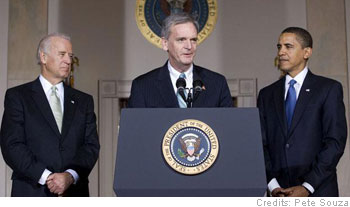 I applaud the tax reform proposal just put forth by Senators Ron Wyden (D-OR) and Judd Gregg (R-NH). Lowering the top corporate tax rate is very important for improving the competitiveness of our exports, and keeping the top individual rate at 35% while repealing the dysfunctional Alternative Minimum Tax is an achievement in itself.
I applaud the tax reform proposal just put forth by Senators Ron Wyden (D-OR) and Judd Gregg (R-NH). Lowering the top corporate tax rate is very important for improving the competitiveness of our exports, and keeping the top individual rate at 35% while repealing the dysfunctional Alternative Minimum Tax is an achievement in itself.
Tax reform is all about efficiency gains. They’re not easy to measure. They don’t lend themselves to politically charged sound bites, but they do improve long-run productivity. They level the playing field among businesses and individuals with similar incomes. Special tax breaks grow on the Tax Code like barnacles on the bottom of a boat, with similar effects. The more barnacles, the slower you go; the more tax breaks, the weaker the economy. However, barnacles on a boat are a lot easier to see.
I would hope for hearings at the Senate Finance and Senate Budget Committees this year, but I’d be surprised if Congress got serious about tax reform until at least a year from now. If the Tax Reform Act of 1986 is any example, it will take a strong push from the president to get this going. That effort started with the Bradley-Gephardt proposal of 1978, which I estimated when I was at the Joint Committee on Taxation. It took eight years of debate and political jostling to enact tax reform then. Hopefully, we can proceed more rapidly this time.
This 20th anniversary retrospective of the ’86 Act is instructive.
See this 2005 CBO study of corporate tax rates around the world.
Here are corporate tax rates by state and by country from a 2008 Tax Foundation study.
One concern: The Wyden-Gregg proposal would encourage high income individuals to become Sub S and Limited Liability Corporations to enjoy the 24% top corporate rate, 11% points lower than the top individual income tax rate. That’s too big a difference. Ideally, we should have identical top rates for corporations and individuals.
- Bulenox: Get 45% to 91% OFF ... Use Discount Code: UNO
- Risk Our Money Not Yours | Get 50% to 90% OFF ... Use Discount Code: MMBVBKSM
Disclaimer: This page contains affiliate links. If you choose to make a purchase after clicking a link, we may receive a commission at no additional cost to you. Thank you for your support!


Leave a Reply